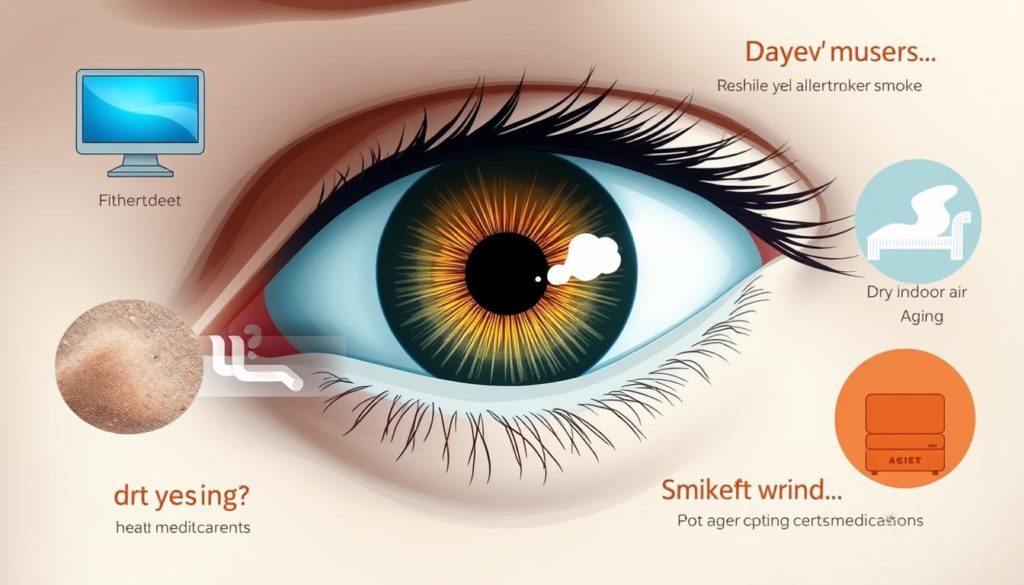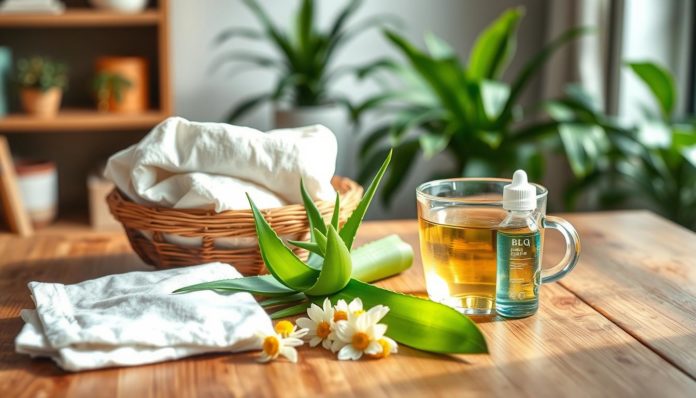About 16 million Americans struggle with dry eyes, feeling burn and redness. They also feel something gritty in their eyes. Instead of medicine, many seek natural ways to ease these symptoms fast.
Not enough tears or tears of poor quality cause dry eyes. This makes seeing clearly and comfortably hard. Luckily, natural remedies for dry eyes can help a lot without needing to see a doctor.
Try simple diy dry eye remedies like warm cloth on eyes or cleaning eyelids. Also, cut down screen time and drink more water. These steps can ease the discomfort. Adding more Omega-3 to your diet is another smart move for eye health. These quick relief for dry eyes tips might just make your eyes feel better at home.
Understanding Dry Eyes and Their Causes
The condition of dry eyes happens when not enough tears are made or tears dry up too fast. Knowing what causes dry eyes helps in finding good dry eye treatment at home. This situation can be due to many reasons like autoimmune diseases, some medicines, getting older, and the environment around us.

Finding out what causes dry eyes early leads to better handling of the condition. Seeing an eye doctor might be needed to figure out the exact reason. They might suggest treatments to make more tears or changes in your life that really help.
In the meantime, there are some easy dry eye treatment at home ways to get better. You could use humidifiers, drink plenty of water, and keep your eyelids clean. These actions can ease the symptoms and make your tears better.
Warm Compress for Soothing Dry Eyes
Dry eyes can be extremely uncomfortable, but there are easy home remedies for dry eyes that can provide relief. Using a warm compress is an effective way to ease dry eye symptoms. It helps improve eye health.

How to Apply a Warm Compress
Applying a warm compress for dry eyes is simple. Just follow these steps:
- Take a clean washcloth and soak it in warm water.
- Wring out the excess water to avoid dripping.
- Place the warm cloth over your closed eyelids for about 5-10 minutes.
- Re-wet the cloth to keep it warm.
- Gently press your eyelids to help express clogged oils. This can improve tear quality.
Benefits of Warm Compresses
Using a warm compress every day has many benefits:
- Reduced Inflammation: Heat can reduce inflammation around the eyelids.
- Improved Tear Quality: Unclogging oil glands can enhance tear quality, relieving dry eye symptoms.
- Ease of Use: This method is simple, making it one of the easy home remedies for dry eyes.
- Consistency Helps: Using it regularly, even when symptoms improve, can maintain eye health.
Cleaning Your Eyelids to Alleviate Dry Eyes
Keeping your eyelids clean is key to managing dry eyes. It stops the oil glands from getting inflamed. Clean eyelids cut down on dry eye symptoms. They keep your eyes healthy and free from things that can irritate them.
Importance of Eyelid Hygiene
Eyelid hygiene is crucial yet often ignored. It’s essential for those looking to ease dry eyes. Cleaning your eyelids gets rid of debris and bacteria. These can inflame or block the oil glands that keep your eyes moist.
Step-by-Step Eyelid Cleaning Guide
To make a cleaning eyelids home remedy, just follow these easy steps:
- Wash your hands well with soap and water.
- Mix a bit of baby shampoo with warm water.
- Use a clean washcloth or cotton pad dipped in the mix to gently clean your eyelash base.
- Rinse your eyelids with lukewarm water.
- Pat your eyelids dry with a clean towel.
Doing good eyelid hygiene every day keeps your eyes healthy. It’s a good way to lessen dry eye symptoms.
Check out this table comparing different home remedies for eyelid cleaning.
| Method | Effectiveness | Cost | Convenience |
|---|---|---|---|
| Baby shampoo and water | High | Low | Easy |
| Over-the-counter eyelid wipes | Moderate | Moderate | Convenient |
| Warm compress and massage | High | Low | Moderate |
Effective Home Remedies for Dry Eyes
Dealing with dry eyes can be both frustrating and uncomfortable. Luckily, there are a variety of effective home remedies for dry eyes that can provide much-needed relief. These remedies can make your daily life more comfortable by managing symptoms.
One of the best home remedies for dry eyes is making simple changes at home. Using a humidifier adds moisture to the air. This is especially helpful in winter, when indoor heat dries out your eyes.
Staying hydrated is another key remedy. Drinking water throughout the day keeps your body and eyes moist. Adding foods rich in omega-3 fatty acids, like salmon and flaxseeds, helps too. These changes combat dry eye symptoms from within.
Wearing protective eyewear outside can protect your eyes from wind and debris. Adding these strategies to your routine can improve your eye health and comfort. It’s important to find what best matches your lifestyle when looking for the best home remedies for dry eyes.
Limiting Screen Time to Prevent Dry Eye Syndrome
Looking at screens too much can really make your eyes dry and uncomfortable. To stop dry eye syndrome from happening, it’s a good idea to follow the 20/20/20 rule. This means every 20 minutes, take a break to look at something 20 feet away for 20 seconds. Doing this can help avoid the strain on your eyes and keep them healthy.
It’s also important to put your screen in the right spot. Try to have your computer monitor a bit lower than your eyes. This can prevent your eyes from getting too tired, which often happens with computer-related dry eye. Making a habit of taking breaks and managing your screen time well is key for healthy eyes.
Want to cut down on screen time and protect your eyes? Here are some tips:
- Use the 20/20/20 rule during your workday.
- Make sure your screen’s brightness fits well with the room light.
- Put an anti-glare protector on your screen to reduce glare.
- Keep your screen at the right angle and below your eye level.
- Do some eye exercises regularly to keep your eyes relaxed.
By keeping a good balance between screen time and these habits, you can really help prevent dry eye syndrome. Plus, you’ll keep your eyes healthier over time.
Hydrating with Water and Other Fluids
Drinking enough water is key for great eye health. It helps make natural tears, easing dry eye issues. Drinking plenty of fluids lessens discomfort and boosts eye health.
Recommended Daily Water Intake
Doctors say you should drink eight to ten glasses of water daily for healthy eyes. This good habit supports overall health and aids in hydrating for dry eyes.
Adding water-rich foods like cucumbers and watermelon to your meals also helps. These foods up your fluid intake, keeping your eyes moist.
Hydration Tips for Better Eye Health
Here are some tips to keep your eyes well-hydrated:
- Carry a water bottle with you throughout the day.
- Set reminders to drink water regularly.
- Avoid excessive caffeine and alcohol, as they can dehydrate you.
- Consume hydrating foods like fruits and vegetables.
- Monitor your urine color; clear or pale yellow indicates good hydration.
By using these tips, you’ll boost your water intake for healthy eyes and lessen dry eye symptoms. Staying hydrated helps your eyes stay comfortable and healthy.
Including Omega-3 Fatty Acids in Your Diet
Adding omega-3 fatty acids to your diet is a smart move for dry eye relief. These nutrients boost the oil glands in your eyes. This helps ease the symptoms of dry eyes.
Foods High in Omega-3s
You can find omega-3s in tasty and healthy foods. Fatty fish like salmon, sardines, and tuna are full of omega-3s. For those on a vegetarian or vegan diet, walnuts, flaxseed, and chia seeds are great plant-based sources. Flaxseed oil and certain other vegetable oils also offer these essential fatty acids.
Supplements and Their Benefits
If you’re looking to fight dry eyes, consider omega-3 supplements. They offer a simple way to get the right amount of omega-3s daily. However, it’s important to talk to a healthcare provider before starting any supplements. Omega-3 supplements can increase tear production and decrease inflammation. This can make your eyes feel better and healthier.
Using Over-the-Counter Eye Drops
Over-the-counter eye drops can be a big help for dry eyes. They work like natural tears to make your eyes feel better. This kind of eye drop is called lubricating eye drops.
Choosing the right eye drops is crucial. For sensitive eyes, drops without preservatives are best. They lessen irritation. But, be careful with drops that have decongestants. They might feel good at first but can make dry eyes worse later on.
Let’s look at different lubricating eye drops:
| Type of Eye Drops | Benefits | Considerations |
|---|---|---|
| Preservative-Free Drops | Reduce risk of irritation, suitable for frequent use | May be more expensive, shorter shelf life |
| Preserved Drops | Longer shelf life, more affordable | Higher risk of irritation with frequent use |
| Decongestant Drops | Temporary redness relief, immediate effect | Can cause rebound redness, not ideal for long-term use |
Before using OTC eye drops, talk to a doctor. They can tell you which eye drops are best for you. This way, you get the relief you need without bad side effects.
Environmental Adjustments for Dry Eye Relief
Making small adjustments around you can greatly ease dry eye discomfort. Start by keeping fans and air conditioners from blowing directly at you. This step helps keep your tears from evaporating fast, preventing your eyes from getting dry too quickly.
Bringing moisture back into the air is also a key move for your home. With a humidifier, you can keep the air moist, which helps your eyes stay lubricated. Without a humidifier, placing water pans around your home works to moisten the air too.
It’s vital to keep air clean and think about eye health. Air filters take out dust, pollen, and other tiny bits from your space, aiding in dry eye relief. Wearing glasses or goggles protects your eyes from harsh elements like wind and debris, keeping them from drying out and feeling uncomfortable.
FAQ
What are the best home remedies for dry eyes relief?
To relieve dry eyes, try warm compresses and clean your eyelids. Keep yourself hydrated. Limit how much you look at screens. Add foods with omega-3 fats to your meals. These steps help soothe your eyes and improve comfort.
How can I treat dry eyes naturally at home?
For natural dry eye relief, use warm compresses and keep eyelids clean. Eat foods rich in omega-3s. Drink plenty of water. Limit screen time and consider using lubricating eye drops. Humidifiers and less screen exposure might also aid.
What causes dry eyes?
Dry eyes occur when tears aren’t enough or are of poor quality. Aging, certain medicines, diseases, and factors like wind or too much screen use can cause it. Treating the root cause is key to managing the condition.
How do you use a warm compress for dry eyes?
For a warm compress, soak a cloth in warm water, then wring it out. Lay it over closed eyelids for 5-10 minutes. Keep the cloth warm. Lightly press on eyelids to release oils. This helps manage dry eyes.
What are the benefits of using a warm compress for dry eyes?
Warm compresses ease irritation and unclog glands. They reduce swelling and can boost tear production. Using them regularly helps control dry eye symptoms and improves tear quality.
Why is eyelid hygiene important for managing dry eyes?
Good eyelid hygiene prevents oil gland blockages. It reduces eyelid inflammation and dry eye symptoms. Cleaning your eyelids well can keep your eyes healthy and prevent discomfort.
How do I clean my eyelids to alleviate dry eyes?
To clean your eyelids, soak a cloth or cotton ball in diluted mild soap or baby shampoo. Carefully wipe your lash line, rinse, and dry gently. This keeps glands clear and lowers swelling.
What are some environmental adjustments that can help with dry eyes?
For dry eye relief, add moisture to the air with humidifiers or pans of water. Keep fans and AC from blowing directly at you. Wear glasses to protect against wind and dust. These steps can ease dry eye symptoms.
How can limiting screen time help prevent dry eye syndrome?
Reducing screen time cuts eye strain and helps you blink more. Try the 20/20/20 rule: every 20 minutes, look 20 feet away for 20 seconds. This could help lessen dry eye signs.
What is the recommended daily water intake for better eye health?
Drink eight to ten glasses of water daily for eye health. Staying hydrated boosts tear production and helps keep eyes moist. Eating foods like cucumbers and watermelon also assists.
Which foods are high in omega-3 fatty acids for dry eyes?
Eat omega-3 rich foods like salmon, sardines, and tuna. Walnuts, flaxseed, and some vegetable oils also help. Omega-3 improves eye gland function, reducing dry eye discomfort.
Should I take omega-3 supplements for dry eyes?
Omega-3 supplements might help with dry eyes. Before starting them, talk to a doctor. These supplements can enhance gland function and ease symptoms.
What type of over-the-counter eye drops are best for dry eyes?
The best eye drops for dry eyes are those that mimic natural tears. Choose preservative-free drops to avoid irritation. Steer clear of decongestant drops, as they can make symptoms worse over time.


